一般现在时态讲解
- 格式:docx
- 大小:393.49 KB
- 文档页数:3
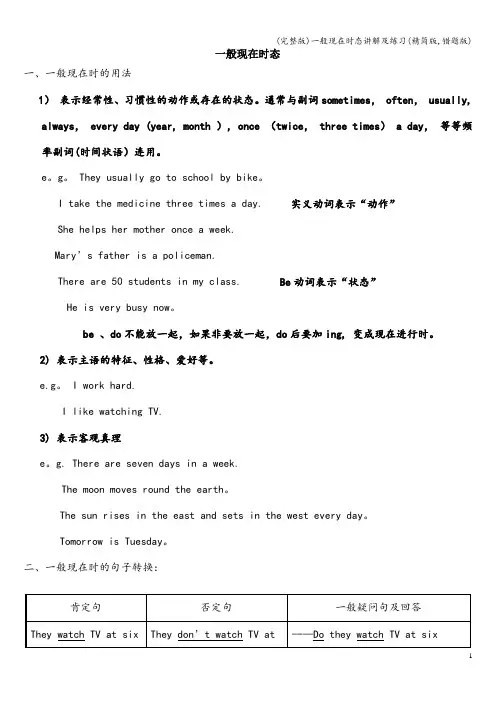
一般现在时态一、一般现在时的用法1)表示经常性、习惯性的动作或存在的状态。
通常与副词sometimes, often, usually, always, every day (year, month ), once (twice, three times) a day,等等频率副词(时间状语)连用。
e。
g。
They usually go to school by bike。
I take the medicine three times a day. 实义动词表示“动作”She helps her mother once a week.Mary’s father is a policeman.There are 50 students in my class. Be动词表示“状态”He is very busy now。
be 、do不能放一起,如果非要放一起,do后要加ing, 变成现在进行时。
2) 表示主语的特征、性格、爱好等。
e.g。
I work hard.I like watching TV.3) 表示客观真理e。
g. There are seven days in a week.The moon moves round the earth。
The sun rises in the east and sets in the west every day。
Tomorrow is Tuesday。
二、一般现在时的句子转换:三、一般现在时的结构:“主语+谓语+其它”,有时为了起强调作用,时间状语也可提前.三单变化:1)多数在动词后+s :play - plays like —likes ask———asks work———works get---gets stay-——stays2)以字母s, x, ch, sh或o结尾的动词,+-es:watch-——watches wish———wishes fix———fixes do——-d oes go---goes pass-—-passes3)以“辅音字母加 - y”结尾的动词,要先变y为i+-es。
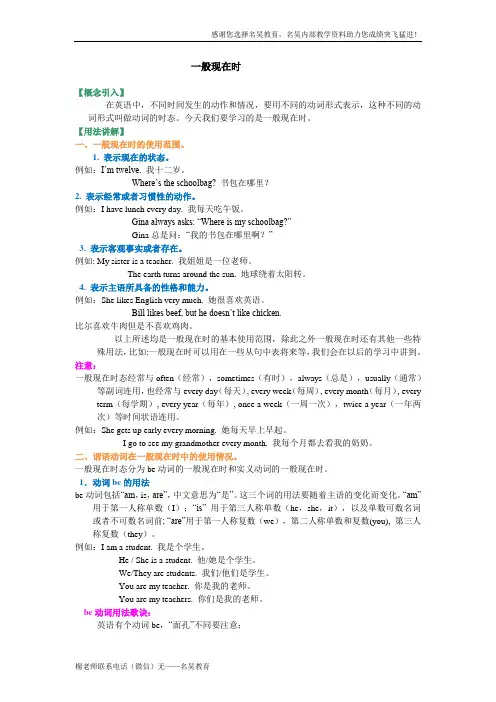
一般现在时【概念引入】在英语中,不同时间发生的动作和情况,要用不同的动词形式表示,这种不同的动词形式叫做动词的时态。
今天我们要学习的是一般现在时。
【用法讲解】一、一般现在时的使用范围。
1. 表示现在的状态。
例如:I’m twelve. 我十二岁。
Where’s the schoolbag? 书包在哪里?2. 表示经常或者习惯性的动作。
例如:I have lunch every day. 我每天吃午饭。
Gina always asks: “Where is my schoolbag?”Gina总是问:“我的书包在哪里啊?”3. 表示客观事实或者存在。
例如: My sister is a teacher. 我姐姐是一位老师。
The earth turns around the sun. 地球绕着太阳转。
4. 表示主语所具备的性格和能力。
例如:She likes English very much. 她很喜欢英语。
Bill likes beef, but he doesn’t like chicken.比尔喜欢牛肉但是不喜欢鸡肉。
以上所述均是一般现在时的基本使用范围,除此之外一般现在时还有其他一些特殊用法,比如:一般现在时可以用在一些从句中表将来等,我们会在以后的学习中讲到。
注意:一般现在时态经常与often(经常),sometimes(有时),always(总是),usually(通常)等副词连用,也经常与every day(每天), every week(每周), every month(每月), every term(每学期), every year(每年), once a week(一周一次),twice a year(一年两次)等时间状语连用。
例如:She gets up early every morning. 她每天早上早起。
I go to see my grandmother every month. 我每个月都去看我的奶奶。
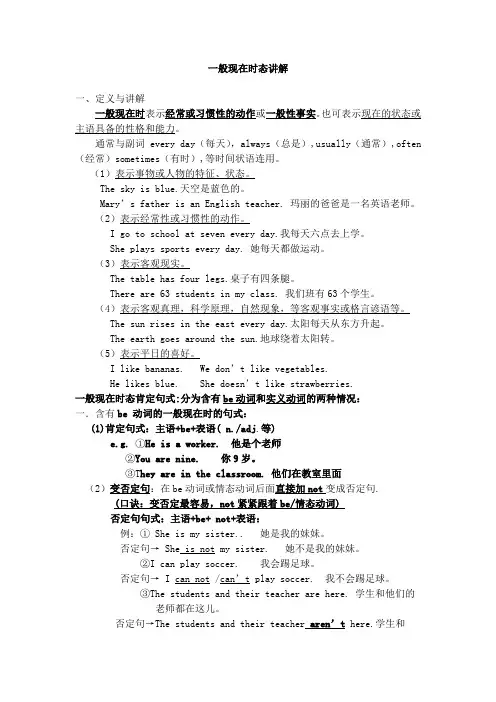
一般现在时态讲解一、定义与讲解一般现在时表示经常或习惯性的动作或一般性事实。
也可表示现在的状态或主语具备的性格和能力。
通常与副词every day(每天),always(总是),usually(通常),often (经常)sometimes(有时),等时间状语连用。
(1)表示事物或人物的特征、状态。
The sky is blue.天空是蓝色的。
Mary’s father is an English teacher. 玛丽的爸爸是一名英语老师。
(2)表示经常性或习惯性的动作。
I go to school at seven every day.我每天六点去上学。
She plays sports every day. 她每天都做运动。
(3)表示客观现实。
The table has four legs.桌子有四条腿。
There are 63 students in my class. 我们班有63个学生。
(4)表示客观真理,科学原理,自然现象,等客观事实或格言谚语等。
The sun rises in the east every day.太阳每天从东方升起。
The earth goes around the sun.地球绕着太阳转。
(5)表示平日的喜好。
I like bananas. We don’t like vegetables.He likes blue. She doesn’t like strawberries.一般现在时态肯定句式:分为含有be动词和实义动词的两种情况:一.含有be动词的一般现在时的句式:(1)肯定句式:主语+be+表语( n./adj.等)e.g. ①He is a worker. 他是个老师②You are nine. 你9岁。
③T hey are in the classroom. 他们在教室里面(2)变否定句:在be动词或情态动词后面直接加not变成否定句.(口诀:变否定最容易,not紧紧跟着be/情态动词)否定句句式:主语+be+ not+表语:例:① She is my sister.. 她是我的妹妹。
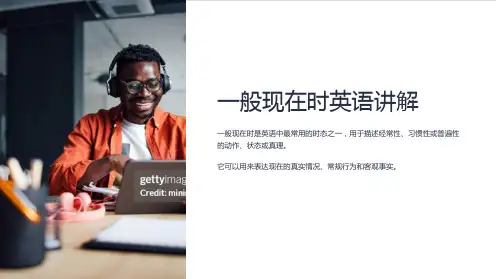
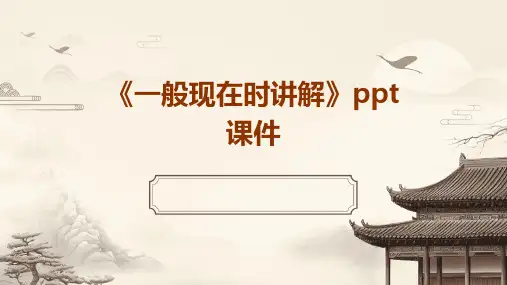

一般现在时态讲解公司内部档案编码:[OPPTR-OPPT28-OPPTL98-OPPNN08]一般现在时态讲解一般现在时(de)用法:1.表示经常性、习惯性(de)动作或存在(de)状态.eg. I go to school on foot. He is very busy now.2.表示主语(de)特征、性格、能力、爱好等.eg. He can swim. I work hard. I like watching TV.3.表示客观真理 eg. There are seven days in a week. 否定句:主语+be+not+其他 eg. Danny is not a good student. 一般疑问句:Be+主语+其他 eg. Is Danny a good student(2)句中有实意动词,如work, go, get, help, study, play 等表示主语(de)动作肯定句:主语+谓语动词+其他 eg. I work hard at school.否定句:主语+don’t 或doesn ’t+谓语动词原形+其他 eg. I don’t work hard at school.疑问句:Do 或Does + 主语+ 动词原形+其他 eg. Do I work hard at school . They have lunch at 12:00.They don’t have lunch at 12:00. Do they have lunch at 12:00注意:单数第三人称做主语时,谓语动词要用单三形式,变否定句须在动词前加助动词doesn’t;变一般疑问句须在句首加助动词does.. Jenny speaks English very well.Jenny doesn’t speak English very well. Does Jenny speak English very well动词第三人称单数(de)变化规则如下: (1)直接在动词词尾加-s.ask---asks work---works get---gets stay---stays play — plays like — likes(2)以字母s, x, ch, sh 或o 结尾(de)动词,在词尾直接加-es.watch---watches wish---wishes fix---fixesdo---does go---goes pass---passes(3)以“辅音字母加 - y”结尾(de)动词,要先变y 为i 再加-es. try---tries study---studies cry---cries fly---flies (4)不规则变化: have----has一般现在时态(de)时间状语为often、 usually、 always、 sometimes等频率副词,on Saturdays、 in the morning(afternoon evening) 、every day 等.常见错误:be动词与实意动词同时出现在句子中例:We are plant (plant) the trees in spring.(误)正解:We plant (plant) the trees in spring.解析:在英语中,be是表状态,do是表动作,两种动词不能同时出现在句子中,可记住如下口诀:“英汉语言有差异,be 、do不能放一起,仔细琢磨细分析,语法千万要牢记.”一般现在时态练习一般现在时态(de)时间状语为often、 usually、 always、 sometimes,on Saturdays、 in the morning/afternoon/ evening 、every day、every week 等.I.用所给词(de)正确形式填空1. We often___________(play) on the playground.2. He _________(get) up at six o’clock everyday.3. __________you _________(brush) your teeth every morning4. What____ (do) he usually _____(do) after school5. Danny _______(study) English, Chinese, Math, Science and Art atschool.6. Mike sometimes __________(go) to the park with his sister.7. At eight at night, she ________(watch) TV with his parents. 8. ________ Mike________(read) English every day9. How many lessons ______your classmate_______(have) on Monday10. What time _______his mother_________(do) the housework11. He often ______(have) dinner at home.12. Daniel and Tommy________ (be) in Class One.13. We___________________ (not watch) TV on Monday.14. Nick _____________________(not go) to the zoo on Sunday.15. They___________ (like) the World Cup16. What ______they often __________(do) on Sat urdays17. Your parents___________ (read) newspapers every day.18. The girl___________ (teach) us English on Sundays.19. She and I _____________(take) a walk together every evening.20.There____________(be) somewaterin the bottle.21. Mike _____________(like) cooking.22.They____________(have) the same hobby.23. My aunt_____________ (look) after her baby carefully.24. Youalways__________(do) yourhomeworkwell.25. I___________ (be) ill. I’m staying in bed.26.She_________(go) to school from Monday toFriday.27. Liu Tao _________(do) not like PE.28. Thechildoften___________ (watch) TV in the evening.29. Su Hai andSuYang _________(have) eight lessons thisterm.30. -What day _________(be) it today -It’s Saturday.31. Don’t make a noise. Grandpa __________________(sleep).32. Tom’s family__________(watch) TV.33. ---What ______ your mother _______(do) every evening---She _______(wash) clothes.34. _______ it______(rain)every day35. --What _______ you _______(do) on Sundays --We ________ (play) football.36. There ________ (be) a football match on TV every morning.37. They often ________ (visit) the Gre at Wall.38. He _____________ (not come).39. The earth __________ (move) round the sun.40.Mr. Wang often______( go) to Shanghai.Π. 以My School Life为题写一篇小短文,不少于60词.__________________________________________________________________ __________________________________________________________________ __________________________________________________________________ __________________________________________________________________ __________________________________________________________________ __________________________________________________________________ __________________________________________________________________ __________________________________________________________________ __________________________________________________________________ ______________________________________________________。

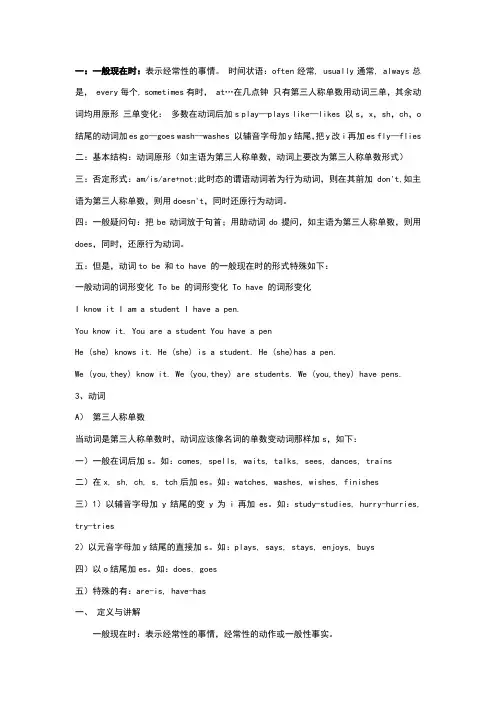
一:一般现在时:表示经常性的事情。
时间状语:often经常, usually通常, always总是, every每个, sometimes有时, at…在几点钟只有第三人称单数用动词三单,其余动词均用原形三单变化:多数在动词后加s play—plays like—likes 以s,x,sh,ch,o 结尾的动词加es go—goes wash--washes 以辅音字母加y结尾,把y改i再加es fly—flies 二:基本结构:动词原形(如主语为第三人称单数,动词上要改为第三人称单数形式)三:否定形式:am/is/are+not;此时态的谓语动词若为行为动词,则在其前加don't,如主语为第三人称单数,则用doesn't,同时还原行为动词。
四:一般疑问句:把be动词放于句首;用助动词do提问,如主语为第三人称单数,则用does,同时,还原行为动词。
五:但是,动词to be 和to have 的一般现在时的形式特殊如下:一般动词的词形变化 To be 的词形变化 To have 的词形变化I know it I am a student I have a pen.You know it. You are a student You have a penHe (she) knows it. He (she) is a student. He (she)has a pen.We (you,they) know it. We (you,they) are students. We (you,they) have pens.3、动词A)第三人称单数当动词是第三人称单数时,动词应该像名词的单数变动词那样加s,如下:一)一般在词后加s。
如:comes, spells, waits, talks, sees, dances, trains二)在x, sh, ch, s, tch后加es。
如:watches, washes, wishes, finishes三)1)以辅音字母加y结尾的变y为i再加es。
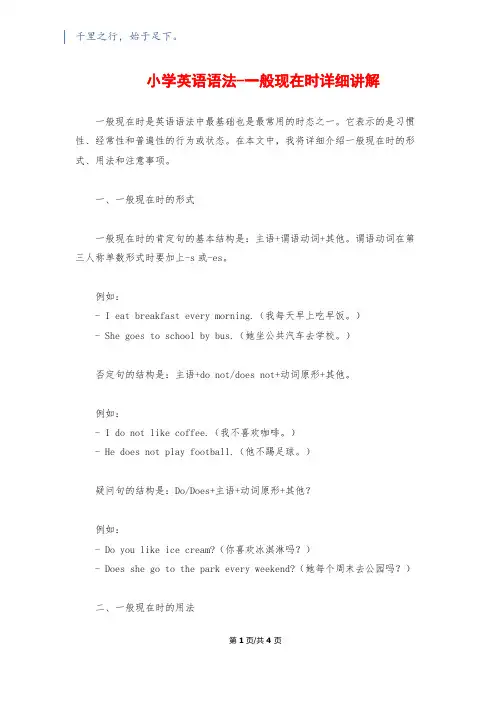
小学英语语法-一般现在时详细讲解一般现在时是英语语法中最基础也是最常用的时态之一。
它表示的是习惯性、经常性和普遍性的行为或状态。
在本文中,我将详细介绍一般现在时的形式、用法和注意事项。
一、一般现在时的形式一般现在时的肯定句的基本结构是:主语+谓语动词+其他。
谓语动词在第三人称单数形式时要加上-s或-es。
例如:- I eat breakfast every morning.(我每天早上吃早饭。
)- She goes to school by bus.(她坐公共汽车去学校。
)否定句的结构是:主语+do not/does not+动词原形+其他。
例如:- I do not like coffee.(我不喜欢咖啡。
)- He does not play football.(他不踢足球。
)疑问句的结构是:Do/Does+主语+动词原形+其他?例如:- Do you like ice cream?(你喜欢冰淇淋吗?)- Does she go to the park every weekend?(她每个周末去公园吗?)二、一般现在时的用法第1页/共4页1. 表示习惯或经常性的动作:- I write in my diary every night.(我每天晚上写日记。
)- They play basketball every Sunday.(他们每个星期天打篮球。
)2. 表示客观事实、自然规律或科学真理:- Water boils at 100 degrees Celsius.(水在100摄氏度时煮沸。
)- The sun rises in the east.(太阳从东方升起。
)3. 表示感觉、想法和喜好:- I love chocolate.(我喜欢巧克力。
)- He hates to wake up early.(他讨厌早起。
)4. 表示现时状态或现时临时的动作:- I am a student.(我是一个学生。
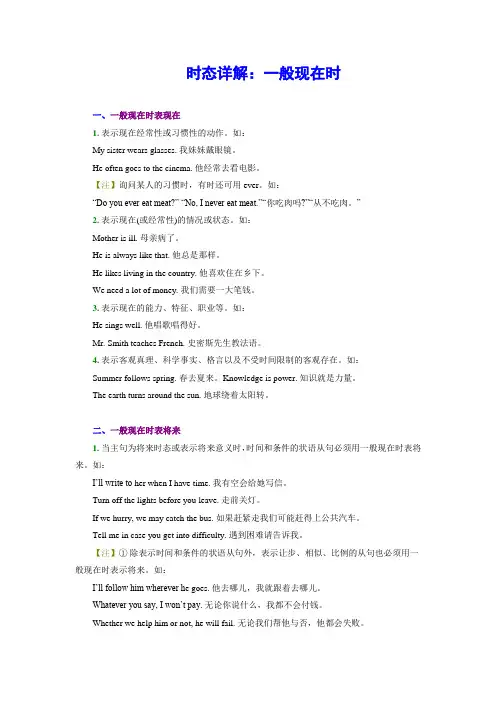
时态详解:一般现在时一、一般现在时表现在1.表示现在经常性或习惯性的动作。
如:My sister wears glasses. 我妹妹戴眼镜。
He often goes to the cinema. 他经常去看电影。
【注】询问某人的习惯时,有时还可用ever。
如:“Do you ever eat meat?” “No, I never eat meat.”“你吃肉吗?”“从不吃肉。
”2.表示现在(或经常性)的情况或状态。
如:Mother is ill. 母亲病了。
He is always like that. 他总是那样。
He likes living in the country. 他喜欢住在乡下。
We need a lot of money. 我们需要一大笔钱。
3.表示现在的能力、特征、职业等。
如:He sings well. 他唱歌唱得好。
Mr. Smith teaches French. 史密斯先生教法语。
4.表示客观真理、科学事实、格言以及不受时间限制的客观存在。
如:Summer follows spring. 春去夏来。
Knowledge is power. 知识就是力量。
The earth turns around the sun. 地球绕着太阳转。
二、一般现在时表将来1.当主句为将来时态或表示将来意义时,时间和条件的状语从句必须用一般现在时表将来。
如:I’ll write to her when I have time. 我有空会给她写信。
Turn off the lights before you leave. 走前关灯。
If we hurry, we may catch the bus. 如果赶紧走我们可能赶得上公共汽车。
Tell me in case you get into difficulty. 遇到困难请告诉我。
【注】①除表示时间和条件的状语从句外,表示让步、相似、比例的从句也必须用一般现在时表示将来。
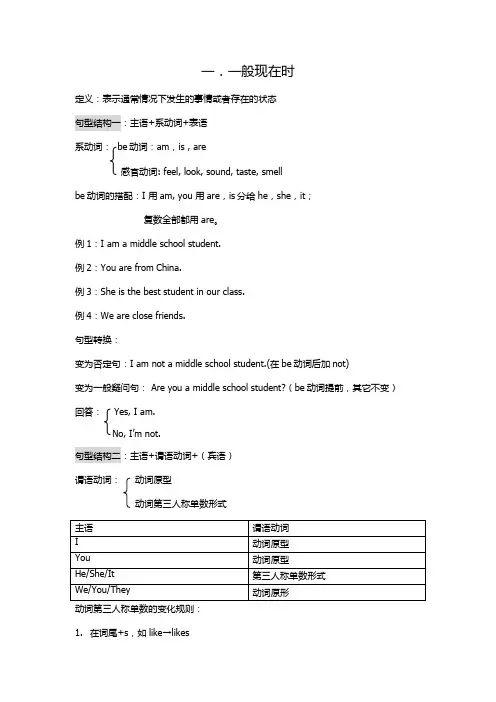
一.一般现在时定义:表示通常情况下发生的事情或者存在的状态句型结构一:主语+系动词+表语系动词: be动词:am,is , are感官动词: feel, look, sound, taste, smellbe动词的搭配:I 用am, you 用are,is分给he,she,it;复数全部都用are。
例1:I am a middle school student.例2:You are from China.例3:She is the best student in our class.例4:We are close friends.句型转换:变为否定句:I am not a middle school student.(在be动词后加not)变为一般疑问句: Are you a middle school student?(be动词提前,其它不变)回答: Yes, I am.No, I’m not.句型结构二:主语+谓语动词+(宾语)谓语动词:动词原型动词第三人称单数形式1.在词尾+s,如like→likes2.当动词以s,x, sh, ch结尾时,在词尾+es,如watch→watches3.当动词以“辅音+y”结尾时,改“y”为“i”并在词尾+es, 如study→studies4.不规则变化:①have→has②do→does③go→does例5:My mum comes home early everyday.例6: I have many friends.例7: The student often watches TV on weekend.句型转换:变为否定句:My mum does not come home early everyday.(在谓语动词前加do not 或does not,动词变成原型)变为一般疑问句:Does your mum come home early everyday?(在整个句子前加Do 或Does,动词变成原型)回答: Yes, she does.No, she doesn’t.特殊疑问句的变化规则:三步走,一换二代三提前例1:Martin is in the park.(对划线部分提问)一换:换成一般疑问句Is Martin in the park?二代:把划线部分用特殊疑问词代入where三提前:把特殊疑问词提前Where is Martin?练习一:请把例2、3、4、6、7改成否定句、一般疑问句及其回答。
一般现在时讲解什么是一般现在时?一般现在时是英语中最基本的时态之一,表示现在经常发生或普遍存在的动作、习惯、真理或状态。
在句子中,一般现在时使用主语的原形动词加上第三人称单数或复数的词形变化。
例如:she plays tennis every weekend(她每个周末打网球)。
一般现在时的使用场景:1. 经常性动作一般现在时经常用于表示一种经常或重复发生的动作。
例如:•I walk my dog every morning.(我每天早上遛狗。
)•They eat dinner at 6 p.m. every day.(他们每天晚上六点吃晚饭。
)2. 习惯或规律一般现在时还可以用于表示一种习惯或规律。
例如:•He always drinks coffee in the morning.(他每天早上都喝咖啡。
)•We never go to bed before 11 p.m.(我们从不在晚上11点之前睡觉。
)3. 真理或普遍规律一般现在时也可以用于陈述普遍真理或规律。
例如:•The sun rises in the east.(太阳从东方升起。
)•Water boils at 100 degrees Celsius.(水在100摄氏度沸腾。
)一般现在时的用法:1. 肯定句在肯定句中,一般现在时使用主语的原形动词。
例如:•He eats breakfast every morning.(他每天早上吃早饭。
)•They go to school by bus.(他们乘公交车上学。
)2. 否定句在否定句中,一般现在时使用do not或does not连接主语与动词的原形形式。
例如:•She does not like coffee.(她不喜欢咖啡。
)•They do not play football on Sundays.(他们星期天不踢足球。
)3. 疑问句在疑问句中,一般现在时使用do或does加上主语和动词的原形形式。
一般现在时时态讲解_1.一般现在时(1)一般现在时可以表示习惯性动作,即不断重复发生的动作。
常和副词 usually, often, always, sometimes, regu?larly ,near,occasionally,every year, every week等连用。
He s working. He always works at night.―他在工作。
4常常在晚上工作。
(2)二般现在时可用以陈述永恒的真理。
Summer follows spring.春去夏来。
(3) 般现在时可用以陈述现在时段发生或存在的事件、动作或状况。
这些事件、动作或情境说不定会无限期地持续下去。
My sister wears glasses.我妹妹戴眼镜。
(4)一般现在时可以表示按规定、计划或安排要发生的动作,常用于谈论时间表、节目单或日程:表上所安排的事情。
这类动词有:be,go, come, start, depart, arrive, begin, leave 等。
The train leaves at 7 : 00 p. m.火车在下午7点离开。
(5)在时间状语从句或条件状语从句中,通常用一般现在时代替将来时。
Whenever it rains the roof leaks.只要下雨屋顶就漏水。
(6) 般现在时可用于戏剧性的叙述。
在描述戏剧、歌剧等中的动作时极为有用。
也常用于电台评论员、解说员对运动项目、公共集会等的报道中。
When the curtain rises,Juliet is writing at her desk. Suddenly, the window opens and a masked man enters. 幕启时,朱丽叶正坐在桌旁写字。
忽然,窗户开了,一个戴面罩的人走进来。
千里之行,始于足下。
学校英语语法_一般现在时具体讲解一般现在时(Simple Present Tense)是英语中最基本的时态之一,用来表达经常性或习惯性的动作、客观事实、常规活动等。
以下是一般现在时的具体讲解。
1. 构成:主语 + 动词原形(第三人称单数要在动词后加-s)+ 其他。
例如:- I play soccer on weekends.(我周末踢足球。
)- He watches TV every evening.(他每天晚上看电视。
)2. 主语:一般现在时的主语可以是第一人称、其次人称或第三人称。
例如:- I go to school every day.(我每天去上学。
)- You like ice cream.(你宠爱冰淇淋。
)- She plays the piano well.(她弹得很好。
)3. 动词的变化:- 第三人称单数一般在动词后面加上-s或-es。
例如:he/she/itplays(he plays,she plays,it plays),he/she/it watches(he watches,she watches,it watches)。
- 一般现在时的否定形式是在动词前面加上do not(don’t)或does not(doesn’t)。
例如:I do not dance(我不跳舞),She does not like coffee(她不宠爱咖啡)。
- 一般现在时的疑问形式是把do或does放在主语前面。
例如:Do you play tennis?(你打网球吗?),Does she go to the gym?(她去健身房吗?)4. 使用场景:第1页/共2页锲而不舍,金石可镂。
- 表达经常性或习惯性的动作。
例如:I eat breakfast every morning.(我每天早上吃早餐。
)- 表达客观事实、普遍真理等。
例如:The sun rises in the east.(太阳从东方升起。
一般现在时的讲解
一、定义:表示经常或习惯性发生的动作或存在的状态通常与副词every day(每天),always(总
是),usually(通常),often(经常)sometimes(有时),等时间状语连用。
1.表示事物或人物的特征、状态。
如:He is my friend.
2.表示经常性或习惯性的动作。
如:I get up at six every day.
3.表示客观现实。
如:The earth goes around the sun.地球绕着太阳转。
4.表示平日的喜好。
I like bananas./ We don’t like vegetables.
三、动变规则:
1、一般在动词加s。
如:talk –talks, live –lives
2、以s, x, ch, sh或o结尾的动词加es。
如:watch –watches, wash –washes, go –goes,do–does
3、以辅音字母加y结尾的动词,把y变成i再加es。
如:study—studies;fly –flies;
4、特殊have的第三人称单数为has。
be的第三人称单数为is。
一、一般现在时态1、一般现在时态的概念(1)、表示现在的状态(谓语多用系动词be)(2)、表示经常或习惯性的动作(谓语是do类动词)(3)、表示主语具备的性格和能力(谓语多是speak like enjoy)2、be (am is are)“是”,英语中最重要的一个系动词。
do类动词,又叫实义动词。
例如:have (有),play(玩,打)等。
3、一般现在时态的动词形式一般现在时态规定:系动词be用现在式am is are 三个形式。
do 类动词用原型或第三人称单数形式。
“原形动词+ s / es”构成“第三人称单数形式”,与单数名词变复数名词方法一样。
(1)、一般情况,动词后直接加s例如:brings 带来calls 打电话meets 遇见needs 需要(2)、以字母e结尾的动词,直接加s (读/ z /)例如:Likes 喜欢takes 带走(3)、以字母s x ch sh o结尾的动词,加es例如:does 做goes 走,去watches 观看(4)、以“辅音字母+ y”结尾的名词,变y为i,加es例如:stud y →studies 学习(思考:enjoy play have的第三人称单数形式是)4 、一般现在时态主语与谓语动词的搭配第一人称单数主语:I +am 或V原形he she itthis that第三人称单数主语单数名词不可数名词+ is ; V单三形式动词不定式动名词We you they复数主语these those + are ; V原形复数名词本块习题:用所给词的正确形式填空1、I _______ ( have ) a soccer ball .2、She ______ ( have ) two __________ ( pingpong—ball ) .3、He ______ ( play ) sports every day .4、We ______ ( speak ) English .5、Tom ______ ( call ) Jim every day .6、My daughter ______ ( like ) apples .7、His ______ ( friend ) knows English .8、The girl ______ ( study ) English sometimes .9、The _______ ( boy ) often watch TV .10、Her uncle ______ ( go ) home on foot 。
一般现在时态讲解Company number:【0089WT-8898YT-W8CCB-BUUT-202108】一般现在时态讲解一般现在时的用法:1.表示经常性、习惯性的动作或存在的状态。
eg. I go to school on foot. He is very busy now.2.表示主语的特征、性格、能力、爱好等。
eg. He can swim. I work hard. I like watching TV.3.表示客观真理 eg. There are seven days in a week. The moon moves around the earth. 一般现在时的句型结构:(1)句中有be(am,is,are),在be上做变化:肯定句:主语+be+其它 eg. Danny is a good student.否定句:主语+be+not+其他 eg. Danny is not a good student.一般疑问句:Be+主语+其他 eg. Is Danny a good student(2)句中有实意动词,如work, go, get, help, study, play等表示主语的动作肯定句:主语+谓语动词+其他 eg. I work hard at school.否定句:主语+don’t或doesn’t+谓语动词原形+其他 eg. I don’t work hard at school.疑问句:Do或Does + 主语+ 动词原形+其他 eg. Do I work hard at school. They have lunch at 12:00.They don’t have lunch at 12:00.Do they have lunch at 12:00注意:单数第三人称做主语时,谓语动词要用单三形式,变否定句须在动词前加助动词doesn’t;变一般疑问句须在句首加助动词does。
. Jenny speaks English very well.Jenny doesn’t speak English very well.Does Jenny speak English very well (1)直接在动词词尾加-s.ask---asks work---works get---gets stay---stays play — plays like — likes(2)以字母s, x, ch, sh或o结尾的动词,在词尾直接加-es.watch---watcheswish---wishes fix---fixesdo---does go---goespass---passes(3)以“辅音字母加 - y”结尾的动词,要先变y为i再加-es.try---tries study---studies cry---cries fly---flies(4)不规则变化: have----has一般现在时态的时间状语为often、 usually、 always、 sometimes等频率副词,on Saturdays、 in the morning(afternoon evening) 、every day等。
常见错误:be动词与实意动词同时出现在句子中例:We are plant (plant) the trees in spring.(误)正解:We plant (plant) the trees in spring.解析:在英语中,be是表状态,do是表动作,两种动词不能同时出现在句子中,可记住如下口诀:“英汉语言有差异,be 、do不能放一起,仔细琢磨细分析,语法千万要牢记。
”一般现在时态练习一般现在时态的时间状语为often、 usually、 always、 sometimes,on Saturdays、in the morning/afternoon/ evening 、every day、every week等。
I.用所给词的正确形式填空1. We often___________(play) on the playground.2. He _________(get) up at six o’clock everyday.3. __________you _________(brush) your teeth every morning4. What____ (do) he usually _____(do) after school?5. Danny _______(study) English, Chinese, Math, Science and Art at school.6. Mike sometimes __________(go) to the park with his sister.7. At eight at night, she ________(watch) TV with his parents.8. ________ Mike________(read) English every day?9. How many lessons ______your classmate_______(have) on Monday?10. What time _______his mother_________(do) the housework?11. He often ______(have) dinner at home.12. Daniel and Tommy________ (be) in Class One.13. We___________________ (not watch) TV on Monday.14. Nick _____________________(not go) to the zoo on Sunday.15. They___________ (like) the World Cup16. What ______they often __________(do) onurdays17. Your parents___________ (read) newspapers every day.18. The girl___________ (teach) us English on Sundays.19. She and I _____________(take) a walk together every evening.(be) somewaterin the bottle.21. Mike _____________(like) cooking.(have) the same hobby.23. My aunt_____________ (look) after her baby carefully.24. Youalways__________(do) yourhomeworkwell.25. I___________ (be) ill. I’m staying in bed.(go) to school from Monday toFriday.27. Liu Tao _________(do) not like PE.28. Thechildoften___________ (watch) TV in the evening.29. Su Hai andSuYang _________(have) eight lessons thisterm.30. -What day _________(be) it today -It’s Saturday.31. Don’t make a noise. Grandpa __________________(sleep).32. Tom’s family__________(watch) TV.33. ---What ______ your mother _______(do) every evening---She _______(wash) clothes. 34. _______ it______(rain)every day35. --What _______ you _______(do) on Sundays --We ________ (play) football.36. There ________ (be) a football match on TV every morning.37. They often ________ (visit) theat Wall.38. He _____________ (not come).39. The earth __________ (move) round the sun.. Wang often______( go) to Shanghai.Π. 以My School Life为题写一篇小短文,不少于60词。
________________________________________________________________________ ________________________________________________________________________ ________________________________________________________________________ ________________________________________________________________________ ________________________________________________________________________ ________________________________________________________________________ ________________________________________________________________________ ________________________________________________________________________ ________________________________________________________________________。